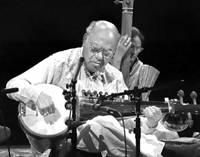|
New Delhi: Legendary sarod
exponent Ustad Ali Akbar Khan, one of the greatest Indian classical
musicians of modern times, was in personal life a man of great
compassion, innocence and humility.
He felt that
life's greatest lessons were either taught by children who knew
nothing, or by stalwarts - because the mediocre always found faults.
Ustad Ali
Akbar Khan, who took Indian classical music to the world stage,
passed away in California Friday after a prolonged kidney aliment.
He was 87.
Citing an
instance of his sharp memory, humility and compassion, noted Indian
classical vocalist Rita Ganguly of the Dhrupad gharana told IANS
from Mumbai, "Once as a three-and-a-half year old, I attended a
concert in Lucknow by the Maihar band conducted by Baba Allauddin
Khan, Ali Akbar Khan's father, the founder of the Senia-Maihar
gharana. I just walked up on to the centre-stage and started dancing
on my own till the band played. No one could stop me.
"Several decades
later in 1982, at a concert in Udaipur, Ustad Ali Abkar Khan, who
was also part of the band in Lucknow, reminded me of the incident
and narrated it in detail because it had slipped from my memory. He
said he learnt from me - a toddler who knew nothing about music - a
vital lesson because of the gay abandon with which I danced."
The Maihar band
was a group of established musicians assembled by Ustad Allauddin
Khan in the 1950s.
That fateful
night in Lucknow was the beginning of Ganguly's career and the
"reminder of the incident by none other than the maestro himself"
intensified her life-long love affair with the music of Ustad Ali
Akbar Khan.
"He is the
greatest musician India has ever produced and his death is nothing
short of tragedy in the world of Indian music. He tops the list of
three trend-setters in Indian music that includes Begum Akhtar and
Ustad Amir Khan," Ganguly said.
Born on April 14,
1922, in Comilla in present day Bangladesh, maestro Ali Akbar Khan
traces his ancestry to Mian Tansen, the 16th century musical genius
and court musician of Emperor Akbar. His sister, Annapurna Devi, was
married to sitar legend Pandit Ravi Shankar.
The sarod maestro
is survived by 11 children, including the great sarod player Ustad
Ashish Khan.
Ali Akbar was one
the early band of Indian classical musicians who took Indian
traditional music to the world - especially to the US and helped it
carve a niche for itself.
He is the creator
of several famous ragas, including Gauri Manjari, Lajwanti, Madhavi
and Madhu Malati.
He gave his first
public performance at the age of 13. In his early 20s, the sarod
exponent cut his first HMV label and subsequently became the court
musician of the Maharaja of Jodhpur for seven years. He learnt music
from his father Ustad Allauddin Khan as well as uncle Fakir
Aftabuddin. He was also part of the Uday Shankar's music and dance
ensemble.
His upbringing
was austere and he practised music for 18 hours a day.
He founded the
Ali Akbar College of Music in Kolkata in 1956 and relocated to US in
1965 to teach Indian music to American youth. He set up the Ali
Akbar Khan College of Music in San Rafael near San Francisco and
Switzerland. He has millions of fans across the globe.
Musician-writer
Peter Lavezzoli, in his book 'Bhairavi' says Ali Akbar Khan was the
first Indian classical musician to appear on US television. At the
request of violinist Yehudi Menuhin, Ali Akbar visited the US in
1955 and performed at the Museum of Modern Art in New York. He also
cut an LP - the first recording of Indian classical music - in the
US.
"I recorded a
half an hour interview-based programme with him on Doordarshan 15
years ago. He was playing at Maihar near Jabalpur, the hub of his
gharana of music. I think Ali Akbar Khan was a purist and one of the
greatest sarod players of the century," veteran Doordarshan
presenter and music writer Sharad Dutt told IANS.
Recalling his
contribution to Hindi cinema music, Dutt said Bollywood musician
Jaidev was one of Ali Akbar's disciples.
"That is why
Jaidev's compositions are full of sarod," Dutt said.
Ali Akbar Khan
composed the songs and background score for the 1953 movie "Aandhiyan",
a Navketan production directed by Chetan Anand, starring Dev Anand
and Kalpana Kartik. "The music was widely acclaimed," Dutt said.
His list of
awards is long. In 1960, he was conferred the Best Musician of the
Year Award for his work in the movie "Hungry Stones" directed by
Tapan Sinha and in 1963 he was honoured with the President of India
Award. He was also given the Padma Bhushan and the Padma Vibushan by
the government.
Besides, he won
several prestigious awards in US and Britain.
"But for the
Indian classical music fraternity - which is tightly knit - he was
always the affectionate big brother. We bonded over the soirees and
the radio programmes in Delhi and Lucknow in the 1940s and 1950s. He
stayed in a house near the Bengali Market when he was in Delhi,"
reminisced Kathak exponent Pandit Birju Maharaj.
|









 I
I